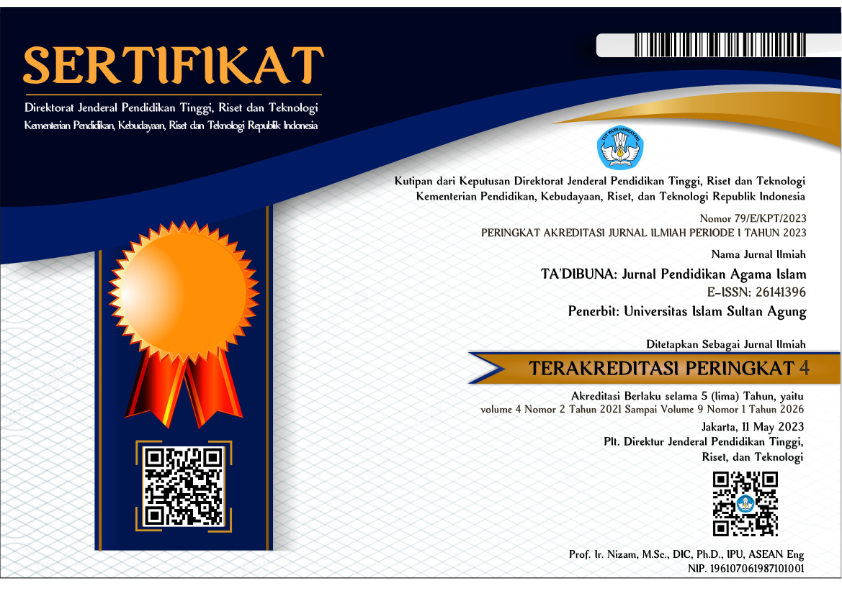Examining Theological and Teleological Intelegence in Shaping the Morality of Islamic Boarding School Students
Abstract
This research aims to examine the level of theological and teleological intelligence in the moral development of students at the Al-Kifayah Riau Islamic boarding school. This research uses a quantitative descriptive approach. The entire relevant population is selected for the study as the total sample. There are 24 male students and 32 female students living in the Al-Kifayah Islamic boarding school dormitory in Riau, who are the research subjects. Data were collected through a questionnaire created specifically for this research, which consists of structured questions aimed at gathering information about theological and telelogical intelligence. The results of this research are that the level of theological intelligence of the majority of students is high, while the level of teleological intelligence is moderate.
Keywords
Full Text:
PDFReferences
Amril. (2017). NILAINISASI ILMU (Sebuah Upaya Integrasi Ilmu dalam Pembelajaran Sekolah di Era Globalisasi). Al-Fikra : Jurnal Ilmiah Keislaman, 7(2), 210. https://doi.org/10.24014/af.v7i2.3791
Amril, A., Fata, A. K., & Nor, M. R. M. (2023). THE EPISTEMOLOGY OF ISLAMIC PHILOSOPHY: A Chronological Review. Ulul Albab, 24(1), 65–88. https://doi.org/10.18860/ua.v24i1.19858
Anam, F. (2019). Islamic Philosophy and the Development of Islamic Thought. International Journal of Nusantara Islam, 7(2), 160–166. https://doi.org/10.15575/IJNI.V7I2.5636
Barkah, A. M. (2022). Peran Konselor Bimbingan Konseling dalam Pembinaan Perilaku Keberagamaan untuk Meningkatkan Akhlak Siswa di SMA Al Ma’some Kabupaten Sumedang. Nautical: Jurnal Ilmiah Multidisiplin Indonesia, 1(8), 729–739.
Basori. (2019). KONTRIBUSI PENDIDIKAN ISLAM DALAM MENGEMBANGKAN MULTIKULTURALISME. Media Komunikasi Umat Beragama, 11(2), 131–155.
Dewi, R. R., Suresman, E., & Suabuana, C. (2021). Pendidikan Kewarganegaraan Sebagai Pendidikan Karakter di Persekolahan. ASANKA: Journal of Social Science And Education, 2(1), 71–84. https://doi.org/10.21154/asanka.v2i1.2465
Islam, N. (2023). Pemikiran Al-Kindi (Rasional-Religius) Tentang Pendidikan Islam Dan Relevansinya Terhadap Pendidikan Islam Kontemporer. Madania: Jurnal Ilmu-Ilmu Keislaman, 13(1), 62. https://doi.org/10.24014/jiik.v13i1.22055
Junedi, J., & Nursikin, M. (2022). Penguatan Akhlak melalui Kitab Ta’lim Muta’alim bagi Santri Pondok Pesantren. Ummul Qura: Jurnal Institut Pesantren Sunan Drajat (INSUD) Lamongan, 17(2), 46–53. https://doi.org/10.55352/uq.v17i2.123
Kamaludin, F. S., Purnama, T. S., & Zirmansyah. (2021). Religious Moderation Strategy in the Virtual Era and Its Implication To Improving the Quality of Education. Jurnal Pendidikan Islam, 7(2), 205–216. https://doi.org/10.15575/jpi.v7i2.14944
Mansur, A. (2017). Implementasi Klarifikasi Nilai Dalam Pembelajaran Dan Fungsionalisasi Etika Islam. Al-Fikra : Jurnal Ilmiah Keislaman, 5(1), 44. https://doi.org/10.24014/af.v5i1.3766
Marzuki, & Ahmad, M. (2018). MOTIF ORANG TUA SANTRI DI PONDOK PESANTREN HM LIRBOYO. Tribakti, 30(1), 53–54.
Muhtador, M. (2020). OTORITAS KEAGAMAAN PEREMPUAN (Studi atas Fatwa-Fatwa Perempuan di Pesantren Kauman Jekulo Kudus). Kafa`ah: Journal of Gender Studies, 10(1), 39. https://doi.org/10.15548/JK.V10I1.267
Putra, J., & Saputri, R. Y. (2022). The Role of Akidah Akhlak Teachers in Fostering Students’ Good Character in MTs Negeri 1 Tanjungkarang. Al-Idarah : Jurnal Kependidikan Islam, 12(1), 26–36. https://doi.org/10.24042/alidarah.v12i1.11699
Quist, T. C. (2022). What philosophy can do for intelligence. Intelligence & National Security, 37(6), 777–790. https://doi.org/10.1080/02684527.2022.2076328
Rahman, F., Sari, I. A., & Sirait, W. R. (2022). Islamic psychology from the perspectives of al-kindi. Edusoshum, 2(2), 104–110. https://doi.org/10.52366/edusoshum.v2i2.40
Rohman, A., Kusuma, A. R., & Firdausi, M. A. (2022). The Essence of ’Aql as Kamāl Al-Awwal in the view of Ibnu Sīnā and its Relation to Education. Dialogia (Ponorogo), 20(1), 176–207. https://doi.org/10.21154/dialogia.v20i1.3533
Sahbana, M. D. R., Arifi, A. M. Al, & Rahman, T. H. (2022). Kecerdasan Intelektual Dalam Perspektif Al-Qur’an. Madania, 12(2), 62. https://doi.org/10.24014/jiik.v12i2.19989
Setyariza, N. A., Kusumawardani, I., Widayati, S. E., Handayani, Y., & Fauzi, S. (2024). Telaah Pemikiran Al Kindi: Konsep Ketuhanan dalam Prespektif Islam. Ahkam, 3(1), 245–252. https://doi.org/10.58578/ahkam.v3i1.2630
Siradj, S. A. (1999). Pesantren masa depan wacana pemberdayaan dan transformasi pesantren. Pustaka Hidayah.
Stefaniuk, T. (2022). Man in Early Islamic Philosophy - Al-Kindi and Al-Farabi. Ruch Filozoficzny, 78(3), 65–84. https://doi.org/10.12775/rf.2022.023
Syafwan Rozi & Devi Wahyuni. (2017). Kebijakan Kepemimpinan Perempuan alam Pendidikan Islam: Refleksi atas Kepemimpinan Rahmah El-Yunusiyyah. ISLAM REALITAS: Journal of Islamic & Social Studies, 3(1).
Tabatabaei, S. M., & Jomeh, S. M. E. (2022). Fourteen-fold Intelligences and the Principles of Mulla Sadra’s Theology. Religious Studies and Theology, 41(1). https://doi.org/10.1558/rst.21433
Widiani, D. (2021). Strategy and Implementation of Character Educa
DOI: https://dx.doi.org/10.30659/jpai.7.2.115-126
Refbacks
- There are currently no refbacks.
Ta’dibuna: Jurnal Pendidikan Agama Islam is published by the Master Program of Islamic Education, Faculty of Islamic Studies, Universitas Islam Sultan Agung (UNISSULA), Indonesia.
Jl. Raya Kaligawe Km. 4, PO BOX 1054/SM, Semarang, Indonesia 50112
Email: jurnaltadibuna@unissula.ac.id








